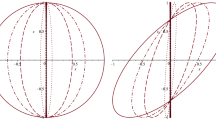Abstract
THE success of Lebedeff and Nichols and Hull in recognising and measuring the pressure of radiation has aroused much interest in radiation pressure generally, real or apparent. It has some interesting and sometimes somewhat difficult theoretical aspects. In the first place, if the ether is really absolutely at rest (this rigidity is a very difficult idea), the moving force on it has no activity, and its time integral VDB can only be called momentum out of compliment. The force becomes active in a moving ether, with interesting consequences not now under examination. The present question is rather how to interpret the pressure of radiation on the assumption of a fixed ether, in the measure of its effects on matter which is either fixed or moving through the ether.
This is a preview of subscription content, access via your institution
Access options
Subscribe to this journal
Receive 51 print issues and online access
$199.00 per year
only $3.90 per issue
Buy this article
- Purchase on Springer Link
- Instant access to full article PDF
Prices may be subject to local taxes which are calculated during checkout
Similar content being viewed by others
Rights and permissions
About this article
Cite this article
HEAVISIDE, O. The Pressure of Radiation. Nature 71, 439–440 (1905). https://doi.org/10.1038/071439a0
Issue Date:
DOI: https://doi.org/10.1038/071439a0
Comments
By submitting a comment you agree to abide by our Terms and Community Guidelines. If you find something abusive or that does not comply with our terms or guidelines please flag it as inappropriate.


